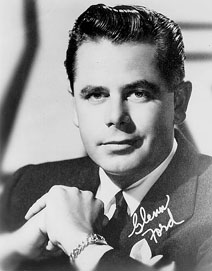Actually, never mind that for now. Let me just assure you that I am NOT here in my apartment watching TV all day long. At times I loathe that idiot box. But I will admit that I tend to have that or the radio on most of the time as sort of background noise that sets the tone for me and my work (research and writing).
So, today, I happened to stumble across Glenn Ford in another B&W movie from the 1940s. Truth be told, I've only known who he is for a few days when I watched him and Bette Davis in "A Stolen Life" (1946) which was, er, watchable.
Today's movie was, I found out, "Young Man With Ideas" (1952). Ford acts as Maxwell Webster, a young attorney from Montana who moves to Los Angeles in search of better economic opportunities. He runs into problems and in the end clears his name and makes it. It's simply a wonderful film with some lovely co-actresses: Julie Webster, Dorianne Gray, Joyce Laramie.
I think the thing that is most thrilling about these films is the sense of values as portrayed in the lives of principled men. In fact, Glenn Ford ends up being quite a cultural model -- certainly not in real life but in his celluloid existence -- for us all. This is what one online site has about Ford:
Glenn Ford said he always played himself, and on screen he usually played easy-going, intelligent, principled men, calm under pressure. He played the kind of man American men and boys wanted to be, and American women wanted to find.
Apparently, he was quite a philanderer in real life -- but that doesn't take away from the awesome goodness represented by his onscreen character or the films they made in those days, the 1940s and 1950s. It's that lost American ideal based on character.
Thinking about these characters played by Ford reminds me a bit of something said about the Notre Dame philosopher Alasdair McIntyre whose book "After Virtue" apparently describes the loss of a common understanding of basic words -- or political symbols -- that embodied who we wanted to be as a political community. I'm talking about words like Truth and Justice and Good and Right. McIntyre apparently says that these words / concepts have lost their meaning. That using them is like trotting out grandma's rags to put on, empty and tattered with no relevance to today.
The excerpt above about the characters played by Ford also reminds me of Professor [Jeffrey] Hart's essay on "the WASP gentleman as cultural ideal," a fascinating but light romp through some of the best of America's social history, when the institutions of society transmitted certain values.
You know what's ironic?
That the other movie I saw tonight was "Pleasantville," a movie that ridicules and makes fun of 1950s America and that society of ideals and that culture of tradition. The less said about this movie the better (although I may return to give it a well-earned beating another time.)
I'll leave you all with a picture of Mr. Ford:

We should mourn for the death of this forgotten American culture that Mr. Ford represents.

1 comment:
Hey Mario:
Jerry here. So, you taken to the blogospere. You are the right one for it. Kathy and I did one for our trip to China in November. I had started posting around April ini anticipation for it. Kathy has posted her notes there and I have some impressions on Chinese public libraries as well. Take a peak: http://musingsvermont.blogspot.com
Zai jian
Jerry from Brattleboro
Post a Comment